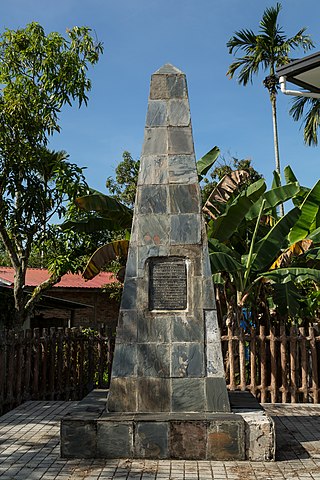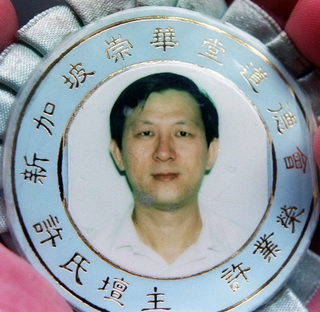Related Research Articles

Kajang is a town in Hulu Langat District, Selangor, Malaysia, located southeast of Kuala Lumpur. Kajang, along with much of Hulu Langat District, is governed by the Kajang Municipal Council. Kajang town is located on the eastern banks of the Langat River. It is surrounded by Cheras, Semenyih, Bangi, Putrajaya and Serdang.

The Malayan Communist Party (MCP), officially the Communist Party of Malaya (CPM), was a Marxist–Leninist and anti-imperialist communist party which was active in British Malaya and later, the modern states of Malaysia and Singapore from 1930 to 1989. It was responsible for the creation of both the Malayan Peoples' Anti-Japanese Army and the Malayan National Liberation Army.
The following lists events that happened during 1994 in Singapore.

Malaya, then under British administration, was gradually occupied by Japanese forces between 8 December 1941 and the Allied surrender at Singapore on 15 February 1942. The Japanese remained in occupation until their surrender to the Allies in 1945. The first Japanese garrison in Malaya to lay down their arms was in Penang on 2 September 1945 aboard HMS Nelson.

Karak is a small town in Bentong District, Pahang, Malaysia. Located at the foothills of Malaysia's Titiwangsa Mountain Range, it is well known as a rest town along the Federal Route 2 from Kuala Lumpur to Kuantan and lends its name to the Karak Highway, or the Kuala Lumpur-Karak Expressway linking it to the country's capital of Kuala Lumpur.
Yeop Mahidin bin Mohamed Shariff was the first Director of Rejimen Askar Wataniah, the reserves component of the Malaysian Army. He was widely regarded as the “Father of Wataniah” for his efforts in establishing the Rejimen Askar Wataniah as a credible force.
Salakau, which means 369 in [[Min Nan|Hokkien], is a Singaporean street gang or secret society based in Singapore. The numbers 3, 6 and 9 add up to 18, which was the name of an older gang; the number signified the 18 arhats of Shaolin Monastery. As one of the oldest and most prominent gangs in the country, they are known to take part in many illicit activities such as narcotics, extortion, prostitution and white-collar crime — and many of their members have been in and out of prison for violent attacks and rioting. They have a renowned gang chant sung in Hokkien that is usually accompanied by techno beats, particularly the song "Million Tears". It was reproduced for Royston Tan's teenage gangster flick 15, albeit with direct references to the gang edited out.

In 1948, the Communists and the British colonial government in Malaya entered a period of guerrilla fighting which has become known to history as the Malayan Emergency.

The Royal Malaysia Police trace their existence to the Malacca Sultanate in the 1400s and developed through administration by the Portuguese, the Dutch, modernization by the British beginning in the early 1800s, and the era of Malaysian independence.

Muar or Bandar Maharani, is a historical town and the capital of Muar District, Johor, Malaysia. It is one of the most popular tourist attractions in Malaysia to be visited and explored for its food, coffee and historical prewar buildings. It was recently declared as the royal town of Johor by Sultan Ibrahim Sultan Iskandar and is the fourth largest urban area in Johor. It is the main and biggest town of the bigger entity region or area of the same name, Muar which is sub-divided into the Muar district and the new Tangkak district, which was upgraded into a full-fledged district from the Tangkak sub-district earlier. Muar district as the only district covering the whole area formerly borders Malacca in the northern part. Upon the upgrading of Tangkak district, the Muar district now covers only the area south of Sungai Muar, whilst the northern area beyond the river is in within Tangkak district. However, both divided administrative districts are still collectively and fondly called and referred to as the region or area of Muar as a whole by their residents and outsiders. Currently, the new township of Muar is located in the Bakri area.

The De Fontaine Memorial is a monument built by the North Borneo Chartered Company to remember an incident on 12 May 1885 that led to an ambush attack to the North Borneo Armed Constabulary, in which five members of the police force were killed. The monument stands in the village of Kawang in the Malaysian state of Sabah.
Cheah Cheang Lim was born in Taiping, Perak, Malaysia. Brought up by his father, Cheah Boon Hean, who was in the trading business, he grew up to become a businessman and miner. He was introduced to the tin mining industries of the time by his uncle Foo Choo Choon, the 'Tin King', who hired him as his attorney. Later, Cheah Cheang Lim was appointed to manage his affairs. Eventually, he started his own company. He also invested in rubber estates but his main interest remained in the tin business.
This article lists important figures and events in the public affairs of British Malaya during the year 1947, together with births and deaths of prominent Malayans. As the Malayan Union, Malaya was a British colony.

On 8 August 2000 in Singapore, a group of three men, who were armed with firearms with an intent to commit robbery, had robbed and killed a taxi driver in midst of a planned crime spree. The victim was a 42-year-old taxi driver named Koh Ngiap Yong, whose taxi was taken by the trio as an escape vehicle for future robbery crimes and whom the three men killed by using a bayonet to stab him to death. In the aftermath of Koh's murder, the robbers had committed yet another robbery and also shot and killed their next victim, 39-year-old Jahabar Sathick, an Indian moneychanger.

On 7 June 2016, 59-year-old Seow Kim Choo at Telok Kurau was murdered by her 23-year-old Indonesian maid Daryati, who stabbed Seow 94 times with a knife, resulting in Seow's death due to multiple wounds to her head and neck. Daryati also attacked and stabbed Seow's husband Ong Thiam Soon twice before she was restrained by Ong, and subsequently, Daryati was arrested and indicted for charges of murder and attempted murder. The motive behind Daryati killing her employer was because she wanted to get back her passport to return to Indonesia, as she was feeling homesick and missed her lesbian lover, who was working as a maid in Hong Kong.

On 2 April 1974, inside an army camp at Singapore's Portsdown Road, 19-year-old National Serviceman Liew Ah Chiew used a rifle to shoot his platoon commander, 21-year-old 2nd Lieutenant Hor Koon Seng of the Singapore Armed Forces (SAF), resulting in Hor dying from a gunshot wound to his chest. Liew was arrested on the same day and was charged with murdering Lieutenant Hor, whom he killed due to his dissatisfaction and anger against Lieutenant Hor for wanting to bring forward disciplinary charges against him. Despite putting up a defence of diminished responsibility, Liew was found guilty of murder and sentenced to death on 25 October 1974. Liew's death sentence was upheld and finalized despite his appeals, and he was hanged on 28 November 1975.

On 15 September 1973, 24-year-old vegetable seller Tan Eng Kim was attacked and stabbed to death by another man at a coffee shop in Bras Basah, Singapore. The killer was Pehn Kwan Jin, a 25-year-old seaman who sought revenge against Tan due to a previous dispute, although Pehn denied that he killed Tan out of vengeance and claimed that it was Tan who tried to attack him and he only acted in self-defence. The defence was rejected and Pehn was found guilty of murdering Tan and sentenced to death in May 1974. Pehn's appeals were dismissed, and he was hanged on 16 April 1976.
References
- 1 2 Police arrest man in train amok hunt, The Straits Times (12 October 1947)
- 1 2 Accused of sergeant's murder, The Straits Times (4 May 1948)
- 1 2 3 Police close on killer: 10 now dead, The Singapore Free Press (October 11, 1947)
- 1 2 3 9 killed, 12 wounded in amok's orgy of killing, The Straits Times (October 11, 1947)
- 1 2 Charged with amok murder, The Straits Times (15 October 1947)
- 1 2 Amok death toll reaches eleven, The Straits Times (13 October 1947)
- 1 2 Amok: Charge of murder, The Straits Times (14 October 1947)
- ↑ Amok slays 5, wounds 12, The Singapore Free Press (10 October 1947)
- ↑ Alleged Amok Sent To Asylum, The Straits Times (30 October 1947)
- ↑ Killed Eleven in Train - Insane, The Straits Times (5 May 1948)
- ↑ The dead and the wounded, The Straits Times (October 11, 1947)